If you are seeing pop-ups from Dss.drivefor.net whenever you are opening a new tab within Internet Explorer, Firefox and Google Chrome, then your computer is infected with an adware or potentially unwated program.
![Dss.drivefor.net pop-up virus [Image: Dss.drivefor.net virus]](http://malwaretips.com/blogs/wp-content/uploads/2013/09/dss-drivefor-net-virus.jpg)
![Dss.drivefor.net Ads [Image: Dss.drivefor.net Ads]](http://malwaretips.com/blogs/wp-content/uploads/2013/09/dss-drivefor-net-ads.jpg)
![Dss.drivefor.net pop-up virus [Image: Dss.drivefor.net pop-up virus]](http://malwaretips.com/blogs/wp-content/uploads/2013/09/dss-drivefor-net-popup.jpg)
This infection is distributed through several means. Malicious websites, or legitimate websites that have been compromised, may drop this Trojan onto a compromised computer. This drive-by-download often happens surreptitiously. Another method used to propagate this type of malware is spam email containing infected attachments or links to malicious websites. The threat may also be downloaded manually by tricking the user into thinking they are installing a useful piece of software.
This virus is also prevalent on peer-to-peer file sharing websites and is often packaged with pirated or illegally acquired software.
- How to remove Dss.drivefor.net redirect (Virus Removal Guide)
- STEP 1: Remove Dss.drivefor.net adware from Internet Explorer, Firefox and Chrome with AdwCleaner
- STEP 4: Remove Dss.drivefor.net pop-up virus with Junkware Removal Tool
- STEP 5: Remove Dss.drivefor.net virus with Malwarebytes Anti-Malware FREE
- STEP 6: Double-check for the Dss.drivefor.net infection with HitmanPro
The Dss.drivefor.net pop-up happens regardless of the web browser or search engine, and if you are seeing ads from Dss.drivefor.net whenever you are doing a Google search or visiting a website, then your computer may be infected with adware or a potentially unwanted program.
This infection is designed specifically to make money. It generates web traffic, collects sales leads for other dubious sites, and will display advertisements and sponsored links within your web browser.
Dss.drivefor.net is not a malicious domain itself, however cyber criminals are using malicious products to display ads from this domain, and thus getting pay-per-click revenue.
You should always pay attention when installing software because often, a software installer includes optional installs, such as this Dss.drivefor.net adware. Be very careful what you agree to install.
Always opt for the custom installation and deselect anything that is not familiar, especially optional software that you never wanted to download and install in the first place. It goes without saying that you should not install software that you don’t trust.
How to remove Dss.drivefor.net redirect (Virus Removal Guide)
This page is a comprehensive guide, which will remove Dss.drivefor.net pop-ups from your computer, and any other adware program that may have been installed during the setup process.
Please perform all the steps in the correct order. If you have any questions or doubt at any point, STOP and ask for our assistance.
STEP 1: Remove Dss.drivefor.net adware from Internet Explorer, Firefox and Chrome with AdwCleaner
STEP 2: Remove Dss.drivefor.net pop-up virus with Junkware Removal Tool
STEP 3: Remove Dss.drivefor.net virus with Malwarebytes Anti-Malware Free
STEP 4: Double-check for the Dss.drivefor.net infection with HitmanPro
STEP 1: Remove Dss.drivefor.net adware from Internet Explorer, Firefox and Chrome with AdwCleaner
The AdwCleaner utility will scan your computer and browsers for Dss.drivefor.net malicious files and registry keys, that may have been installed on your computer without your knowledge.
- You can download AdwCleaner utility from the below link.
ADWCLEANER DOWNLOAD LINK (This link will automatically download AdwCleaner on your computer) - Before starting AdwCleaner, close all open programs and internet browsers, then double-click on the AdwCleaner icon.
![AdwCleaner Icon [Image: AdwCleaner Icon]](//malwaretips.com/blogs/wp-content/uploads/2013/08/adwcleaner-icon.jpg)
If Windows prompts you as to whether or not you wish to run AdwCleaner, please allow it to run. - When the AdwCleaner program will open, click on the Scan button as shown below.
![Click on Scan button to search for Dss.drivefor.net infection [Image: Adwcleaner Scan]](//malwaretips.com/blogs/wp-content/uploads/2013/08/adwcleaner-scan.jpg)
AdwCleaner will now start to search for Dss.drivefor.net malicious files that may be installed on your computer. - To remove the Dss.drivefor.net malicious files that were detected in the previous step, please click on the Clean button.
![Click on the Clean button to remove Dss.drivefor.net virus [Image: AdwCleaner removing infections]](//malwaretips.com/blogs/wp-content/uploads/2013/08/adwcleaner-cleanup.jpg)
AdwCleaner will now prompt you to save any open files or data as the program will need to reboot the computer. Please do so and then click on the OK button.
STEP 4: Remove Dss.drivefor.net pop-up virus with Junkware Removal Tool
Junkware Removal Tool is a powerful utility, which will remove Dss.drivefor.net pop-up ads from Internet Explorer, Firefox or Google Chrome.
- You can download the Junkware Removal Tool utility from the below link:
JUNKWARE REMOVAL TOOL DOWNLOAD LINK (This link will automatically download the Junkware Removal Tool utility on your computer) - Once Junkware Removal Tool has finished downloading, please double-click on the JRT.exe icon as seen below.
![Double-click on the Junkware Removal Tool utility [Image: Junkware Removal Tool]](//malwaretips.com/blogs/wp-content/uploads/2013/06/Junkware-icon.jpg)
If Windows prompts you as to whether or not you wish to run Junkware Removal Tool, please allow it to run. - Junkware Removal Tool will now start, and at the Command Prompt, you’ll need to press any key to perform a scan for the Dss.drivefor.net hijacker.
![Junkware Removal Tool scanning for Dss.drivefor.net pop-up virus [Image: Junkware Removal Tool scanning for Dss.drivefor.net virus]](//malwaretips.com/blogs/wp-content/uploads/2013/06/junkware-removal-tool.jpg)
Please be patient as this can take a while to complete (up to 10 minutes) depending on your system’s specifications. - When the scan Junkware Removal Tool will be completed, this utility will display a log with the malicious files and registry keys that were removed from your computer.
![Junkware Removal Tool final log [Image: Junkware Removal Tool final log]](//malwaretips.com/blogs/wp-content/uploads/2013/06/Junkware-log.jpg)
STEP 5: Remove Dss.drivefor.net virus with Malwarebytes Anti-Malware FREE
Malwarebytes Anti-Malware is a powerfull on-demand scanner which will remove Dss.drivefor.net malicious files from your computer.
- You can download Malwarebytes Anti-Malware Free from the below link, then double click on it to install this program.
MALWAREBYTES ANTI-MALWARE DOWNLOAD LINK (This link will open a download page in a new window from where you can download Malwarebytes Anti-Malware Free) - When the installation begins, keep following the prompts in order to continue with the setup process.
![Malwarebytes Anti-Malware final installation screen [Image: Malwarebytes Anti-Malware final installation screen]](//malwaretips.com/blogs/wp-content/uploads/2013/01/malwarebytes-installation.jpg)
- On the Scanner tab,select Perform quick scan and then click on the Scan button to start scanning your computer.
![Run a Quick Scan with Malwarebytes Anti-Malware [Image: Malwarebytes Anti-Malware Quick Scan]](//malwaretips.com/blogs/wp-content/uploads/2013/01/malwarebytes-quick-scan.jpg)
- Malwarebytes’ Anti-Malware will now start scanning your computer for Dss.drivefor.net malicious files as shown below.
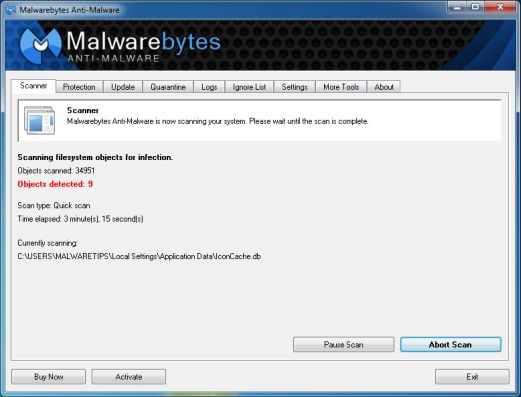
- When the Malwarebytes scan will be completed,click on Show Result.
![Malwarebytes when the system scan has completed [Image: Malwarebytes Anti-Malware scan results]](//malwaretips.com/blogs/wp-content/uploads/2013/01/malwarebytes-scan-results.jpg)
- You will now be presented with a screen showing you the malware infections that Malwarebytes’ Anti-Malware has detected.Please note that the infections found may be different than what is shown in the image.Make sure that everything is Checked (ticked) and click on the Remove Selected button.
![Click on Remove Selected to get rid of Dss.drivefor.net popups [Image:Malwarebytes removing virus]](//malwaretips.com/blogs/wp-content/uploads/2013/01/malwarebytes-virus-removal.jpg)
STEP 6: Double-check for the Dss.drivefor.net infection with HitmanPro
Dss.drivefor.net may also install a ZeroAccess rootkit on victim’s computer, to detect and remove this malicious program we will perform a scan with HitmanPro.
- You can download HitmanPro from the below link, then double-click on it to start this program.
HITMANPRO DOWNLOAD LINK (This link will open a new web page from where you can download HitmanPro) - HitmanPro will start and you’ll need to follow the prompts (by clicking on the Next button) to start a system scan with this program.
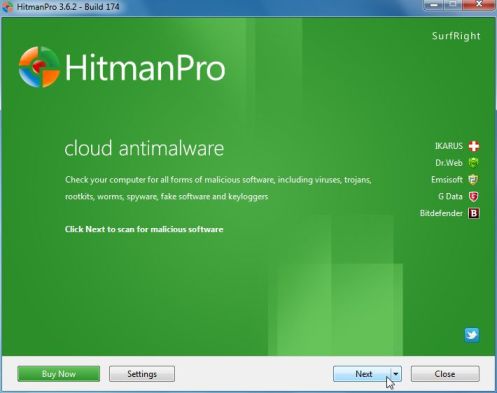
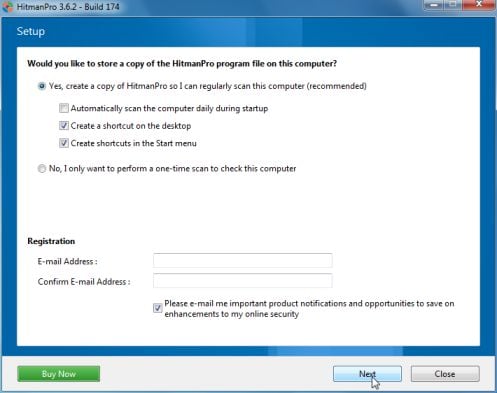
- HitmanPro will start scanning your computer for Dss.drivefor.net malicious files as seen in the image below.
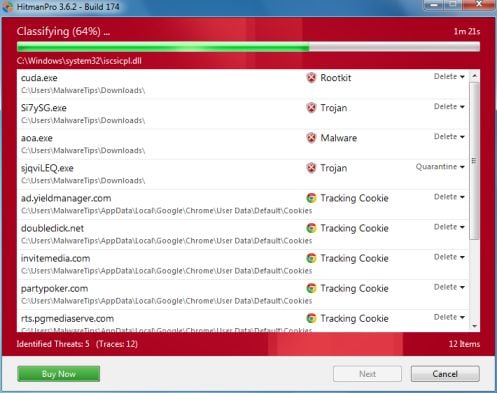
- Once the scan is complete,you’ll see a screen which will display all the infected files that this utility has detected, and you’ll need to click on Next to remove this malicious files.
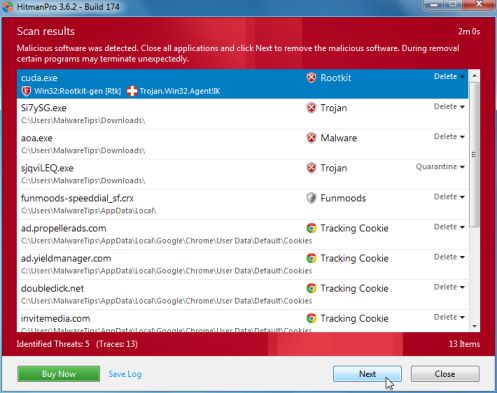
- Click Activate free license to start the free 30 days trial and remove all the malicious files from your computer.
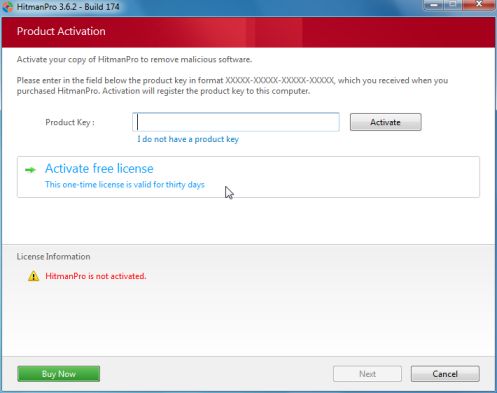
Your computer should now be free of the Dss.drivefor.net infection. If your current anti-virus solution let this infection through, you may want to consider purchasing the PRO version of Malwarebytes Anti-Malware to protect against these types of threats in the future.
If you are still experiencing problems while trying to remove Dss.drivefor.net from your machine, please start a new thread in our Malware Removal Assistance forum.

![Remove Dss.drivefor.net pop-up virus (Removal Guide) 1 [Image: Dss.drivefor.net Ads]](https://malwaretips.com/blogs/wp-content/uploads/2013/09/dss-drivefor-net-ads.jpg)
![Click on Scan button to search for Dss.drivefor.net infection [Image: Adwcleaner Scan]](http://malwaretips.com/blogs/wp-content/uploads/2013/08/adwcleaner-scan.jpg)
![Click on the Clean button to remove Dss.drivefor.net virus [Image: AdwCleaner removing infections]](http://malwaretips.com/blogs/wp-content/uploads/2013/08/adwcleaner-cleanup.jpg)
![Junkware Removal Tool scanning for Dss.drivefor.net pop-up virus [Image: Junkware Removal Tool scanning for Dss.drivefor.net virus]](http://malwaretips.com/blogs/wp-content/uploads/2013/06/junkware-removal-tool.jpg)
![Junkware Removal Tool final log [Image: Junkware Removal Tool final log]](http://malwaretips.com/blogs/wp-content/uploads/2013/06/Junkware-log.jpg)
![Malwarebytes Anti-Malware final installation screen [Image: Malwarebytes Anti-Malware final installation screen]](http://malwaretips.com/blogs/wp-content/uploads/2013/01/malwarebytes-installation.jpg)
![Run a Quick Scan with Malwarebytes Anti-Malware [Image: Malwarebytes Anti-Malware Quick Scan]](http://malwaretips.com/blogs/wp-content/uploads/2013/01/malwarebytes-quick-scan.jpg)

![Malwarebytes when the system scan has completed [Image: Malwarebytes Anti-Malware scan results]](http://malwaretips.com/blogs/wp-content/uploads/2013/01/malwarebytes-scan-results.jpg)
![Click on Remove Selected to get rid of Dss.drivefor.net popups [Image:Malwarebytes removing virus]](http://malwaretips.com/blogs/wp-content/uploads/2013/01/malwarebytes-virus-removal.jpg)






